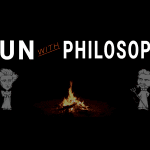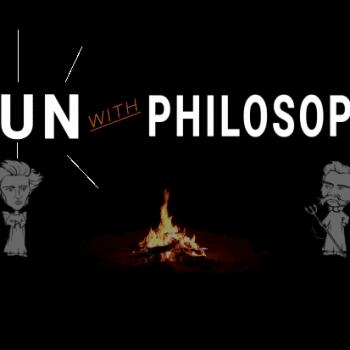
In the opening chapters of Genesis, we read that God created everything in the cosmos in six days. After each creation, we find that God says what He has created was “good”. We oftentimes assume that this proclamation reflects in some way God’s nature. If it is believed that God is good, then it must also be believed that His creation was as good as He is. However, we know this is not logically possible because God cannot create something to reflect His actual being (AKA omnipotence paradox). Therefore, since we know that He is not proclaiming good as a reflection of His nature, then it must be He is using it rhetorically (e.g. this will be good for humanity).
If God is not good, then what is He?
God’s lack of goodness doesn’t make Him unempathetic nor does it make Him evil. In fact, I believe God is amoral, which means that He is neither good nor evil. Just as God is above the laws of nature and even logic, so too is He is above those ethical categories that describe moral decision-making.
If God were a moral being then the possibility of evil is always present within Him. This is what I refer to as a necessary antithesis. Necessary antithesis occurs when a singular claim is made without considering the logical consequences of its antithetical counterpart. For example, if God made moral decisions, then at some point in the process God had to consider the evil option. If He had to consider the evil option, then in some possible world that option is chosen.
God also has no ethical responsibility to another. Humans have ethical responsibility because we live among other humans. There are no laws for God, no rules He must exist by or follow. He is only bound by the logic of His own being.
It seems to me that God’s interaction with humanity in a perceived moral sense is an illusion created by us because we have no way to understand anything outside of moral behavior. Because God is descending from the metaphysical to the physical, He always appears to us to be within the ethical. This ethical framework was created by God for humanity to have boundaries.
One might point to the commandments that God gave to Moses as a justification for the morality of God. However, the commandments that God gave Moses were not commands that reflected God’s nature but were given as a boundary for His followers to live by. A rule of law for the Hebrews.
This raises the question, does God make any decisions? Can His actions ever be judged as right or just? There exist two perspectives when dealing with a metaphysical being like God. The first is the perspective that He has concerning His creation. Second, is the perspective that people have towards God. God’s perspective is unlimited because He has the whole breadth of time available to Him. Whereas, humanity has only the past and the now.
Moreover, God’s actions from His own perspective are what they are, they are neither good nor bad – they just are. However, we judge what we experience from God within an ethical framework because that is our only option. The problem is that when we view God from our ethical perspective, we limit ourselves by not recognizing that there is a dual perspective at play.
Kierkegaard provides us with a great example to better understand this. In Fear and Trembling Kierkegaard helps us to understand something called the “teleological suspension of the ethical”. He uses it in the context of the story of Abraham sacrificing his son, Isaac. From our perspective, God’s proclamation for Abraham to sacrifice his one and only son is absurdly immoral. However, from God’s perspective, it is not.
Why?
Because God already knows what Abraham will do and that there will be no need for human sacrifice. Kierkegaard tells us the only way that we can understand this properly is to suspend our notion of the ethical.
That means when we judge an action from God based on our perspective, we think that the action reflects some ontological aspect of God. But this is just our point of view. Just because we view God from an ethical perspective doesn’t mean that He actually exists within an ethical framework.
The Problem of Evil
There is a direct correlation between the problem of evil and the goodness of God. The problem of evil asks the question, how can God be good while allowing evil and suffering to take place in the world? There have been many attempted explanations, but most fall short. What kind of explanation can we provide for why there exists both evil in the world and a God that is good? (This is also referred to as a theodicy.) The short answer is we cannot.
However, if you take away His ability to perform evil, then you have also taken away any reason God might have for participating in evil. Moreover, the fact that there is evil in the world has nothing to do with whether or not some Divine Being exists. God is not responsible for evil because He did not cause evil to occur – humans did. Evil has nothing to do with the nature of being and therefore, the question of evil as it relates to God’s existence is null.
The better question is why did God not intervene to prevent some evil from occurring? Why did God allow this child to suffer and then die? We call this gratuitous evil. That is, evil that has no apparent reason or purpose to it – it seems arbitrary.
To me, the point that is overlooked is that even if God did not exist, evil still does. Is nature to be held responsible for evil? Who or what would be held responsible for evil in a world where God does not exist? The person who commits the evil is held responsible, both in a world where God does exist, as well as a world where He does not exist.
If anything, the problem of evil does not provide a problem for God’s existence, but rather gives meaning to it. The existence of God provides us hope and meaning into the otherwise dark despair of human suffering. When we are in our deepest despair and question God’s goodness, we can rest in the assurance that God is love. We are told in John 3:16 that God sent His son out of His vast love for humanity. Without God, there is no hope, but there is still human suffering. With God, there is hope and a place filled with the unconditional love of Jesus Christ.
You can view my new UNenlightenment YouTube Channel HERE
You can view my new UNenlightenment Podcast HERE
You can follow me on FaceBook HERE














